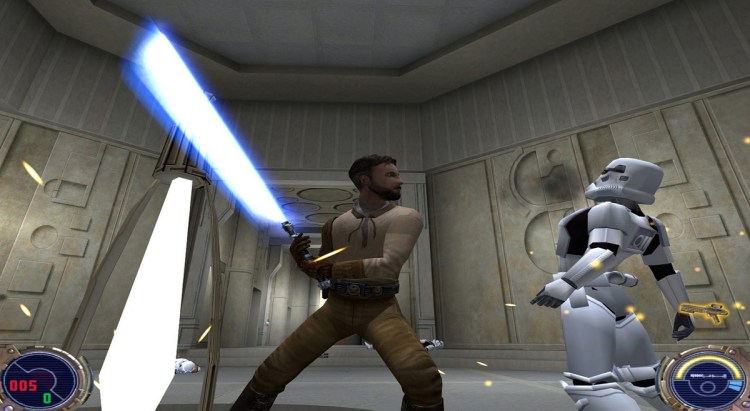Aspyr has been known for decades for its Apple ports of video games. But the Austin, Texas-based company has expanded it repertoire and today it is launching a classic Star Wars game for the Nintendo Switch and PlayStation 4.
Elizabeth Howard, vice president of publishing at Aspyr, said in an interview with GamesBeat that this kind of title — the $10 version of Star Wars Jedi Knight II: Jedi Outcast — is more representative of the kind of game that the company is publishing these days.
Aspyr is taking advantage of the fact that there are more game stores available for a wider variety of content than ever before. And there are more intellectual property owners that want to see their content move to the new platforms where the gamers are active. The basic model for Aspyr is to license games and then act as both publisher and developer for the new content.
I talked with Howard about the company’s aspirations and the outlook for both independent game publishers and developers in the current gaming landscape.
June 5th: The AI Audit in NYC
Join us next week in NYC to engage with top executive leaders, delving into strategies for auditing AI models to ensure fairness, optimal performance, and ethical compliance across diverse organizations. Secure your attendance for this exclusive invite-only event.
Here’s an edited transcript of our interview.

Above: Elizabeth Howard, vice president of publishing at Aspyr
GamesBeat: You have some Switch titles coming from the Jedi series?
Elizabeth Howard: Yeah. We have both Jedi Outcast and Jedi Academy coming to Switch and PlayStation 4. Outcast is dropping later this month, and Academy comes out in the early part of next year, with a further investment in Academy as far as the multiplayer experience. We’re really pumped about bringing that to console players.
GamesBeat: How did you get that? Have you done any Star Wars titles before, or is this the first time?
Howard: Our relationship with LucasArts specifically goes back almost 20 years. We did the Jedi Outcast and Jedi Academy titles for the Mac when they first released. My tenure at Aspyr goes back to doing them the first time. Our core business model is licensing games and then doing the development and publishing. We get the source code and do the engineering and take it to market.
That’s been a valuable asset, that we have this amazing library of content that we can reflect back on now. Almost a generation of gamers have grown up without a lot of these things we were able to touch the first time. We have access to this stuff now to bring to new audiences on new platforms.
It’s not our first time with Lucas, but I’m trying to reflect on whether this is our first time with Lucas as part of Disney. We did Star Wars: Knights of the Old Republic on iOS back in 2013. That came about as Lucas was being acquired by Disney, which was super exciting. It was quite the nailbiter. But we still managed to do it.
GamesBeat: How long ago now did you branch out from the Mac to other platforms?
Howard: This is our second version of that, I would say. We did multiplatform publishing in the early 2000s. We brought a couple of titles — back in the day we did Guitar Hero for PC, actually, and Tony Hawk. We did a few DS titles. We were the publisher of a game called Stubbs the Zombie on Xbox and PC.
With the rest of the economy, things got rough in about 2008 and 2009. We were still in the world of physical goods and limited distribution back then. It was a much more expensive game to play for a bootstrapped private company in Austin, Texas. We refocused on Mac and started exploiting our catalog digitally. That was the next growth phase for us.
Then, in about 2013, it was a matter of, how do we start stretching our capabilities in new ways? From both an engineering and a publishing perspective. We did titles like Star Wars: Knights of the Old Republic, Jade Empire, and a game that I loved back in the old days that we brought back called Fahrenheit. We did those for iOS. More recently we developed Civilization VI on Switch. We also, in the last couple years, have beefed up our publishing capabilities as the multiplatform partner for a number of independent titles, including Layers of Fear and Observer.
We’re seeing the culmination of the last five years of work, extending our development and publishing capabilities to allow us to do much bigger projects. The recent announcements are the first step in a much bigger direction for what you’ll see from us in the future.
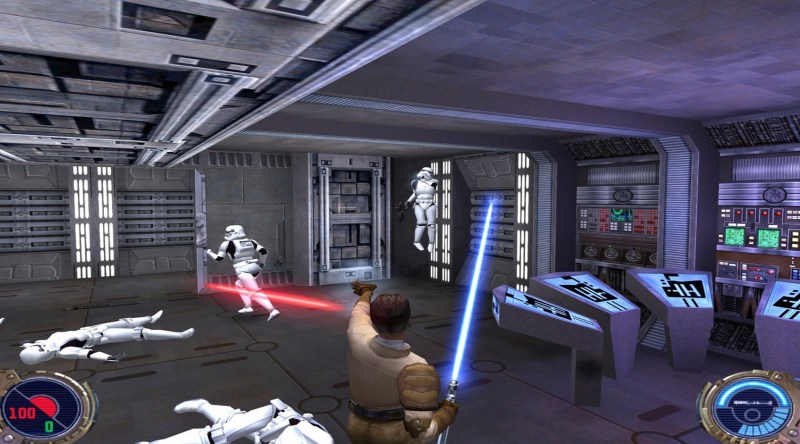
Above: Star Wars Jedi Knight II: Jedi Outcast debuts on September 24 for the Switch and PS4.
GamesBeat: How do you find those teams that can do this work? Is that part of your task, to find developers to remake some of these games on new platforms?
Howard: We’re in a pretty significant growth mode here. We’re at about 90 employees, and we have a significant engineering department. We’re now growing our art, design, UI/UX, and other creative and engineering departments in order to expand our internal capabilities. Then we work with a handful of trusted external developers as well.
But to answer your question, yes, our relationship with Disney in this particular case is, we are the publisher. We have an agreement where we’re figuring out the development and go to market process for these titles.
GamesBeat: You do a lot of this work in house, then? The porting work.
Howard: Right.
GamesBeat: In this case is it almost more like building it from the ground up, or does it still feel more like porting?
Howard: I feel like “porting” overly simplifies the work that goes into it. In the days we were doing Mac titles, that’s a more clear port, because it’s more A to B, PC to Mac. The work now to support the specific UI required for console, and then digging in on the additional features we might be able to bring to a particular experience — with the Switch titles we support rumble. With PS4 we support trophies. We’re doing whatever we can within the licensing limitations to improve the experience for that particular customer.
We brought Civilization VI to a number of other platforms. We brought it to iOS, including iPhone and iPad, and we also did Linux. We were the developer for Switch. That’s taking a keyboard and mouse experience and making it work really well on a touch platform, and then stretching that even further to hybridized touch and controller. We call it a sort of reimagining.
GamesBeat: Are there some rising platforms, from your point of view, and some that may be waning or going away?
Howard: From our perspective, broadly the future is multiplatform. Mac was once our bread and butter as a company, but I don’t imagine that being — I think last year was the first year that other platform revenues exceeded our Mac revenues. It seems like the Apple ecosystem is moving more in the direction of mobile, and we’re doubling down on the triple-A experience, which is more traditionally PC and console.
I am really excited to see the enthusiasm around Switch. I’ll be really curious to see how the market receives this. Certainly the announcement went well. It seems like there’s a bunch of consumer interest. But we’ll see how that shows up in purchasing. That will be fun to find out.
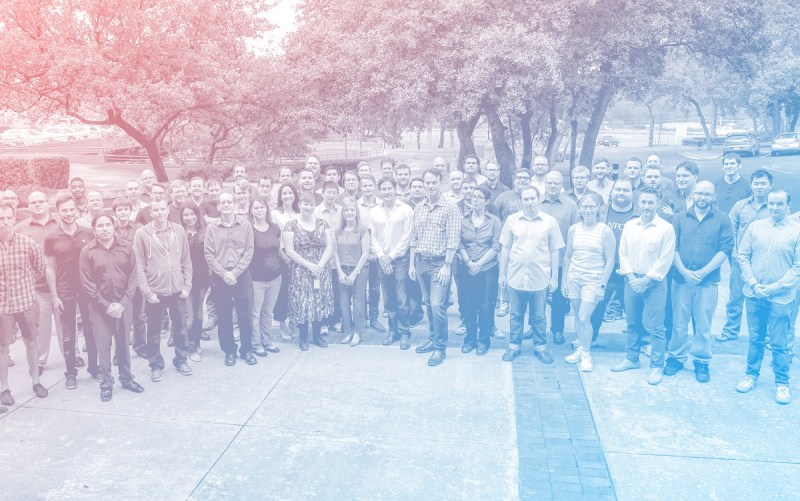
Above: The Aspyr team
GamesBeat: Is Switch a very crowded store, or does it still feel less so than some other storefronts out there?
Howard: The Switch store is less so than others. Certainly Steam has an immense catalog that can make it more challenging to battle your way through the content cloud. That being said, I also don’t know that the Switch digital store is quite as optimized as some of the more established platforms. We’ve always invested in bringing these big brands and triple-A experiences over. We’re able to benefit from the established market interest. For a short time, we’ll have one of the only Star Wars games on the Switch. That’s probably not a bad marketing strategy.
For things like Steam, platforms that are more competitive, we’re looking at unique ways to approach that market. We have an upcoming title that we’ll be announcing soon where we’re looking at a new way to approach monetization that will help with discoverability, as well as exciting customers as far as a new way to allow them to play games without having to pay for them up front, but without quite going down the road of free-to-play.
GamesBeat: What are you doing as far as original titles? Do you have titles coming through a different kind of process that are going to make it to the market soon?
Howard: I’d say right now our big focus, and where we see our growth and opportunity — I always like to talk about the unfair advantage. We’ve spent more than 20 years being triple-A brand and game stewards. Our future is, how do we make that even bigger and better? Growth for us is really around stewarding these beloved games and beloved gameplay. That’s where our strength is. We’re building a team that’s capable of doing that in even bigger ways. Instead of just a re-release, maybe a reimagining, a remake, a bigger undertaking with bigger brands.
Right now our focus is not on original, internal IP. We’ll continue to work with external developers as their publishing partner, taking games to market. But we’re really focused on our growth around these big brands.
GamesBeat: What sort of publishers are direct competitors for you?
Howard: It’s interesting, because we always have this debate. We’re a little bit of this and a little bit of that. Team17 have their own IP that they publish in addition to working as a publishing and development partner. The differentiator for us is we’re clearly focused for the most part, again, on triple-A. Even in the Mac days, we were still the Civ people and the Call of Duty people and the Borderlands people.
I think there’s still a market opportunity for licensed IP. There was a day, call it more than a decade ago, where there was a ton of licensed IP, and frankly not well-executed. Everybody was throwing a game to market in association with a movie launch. But if you look at the success of something like Spider-Man recently, when you’re able to connect brands with players in a polished way, it still works. Those kinds of games might be where we exercise more creativity.
GamesBeat: Do you have any interest in raising money? If there’s a growth plan a year from now or a couple of years from now, what do you expect to be like?
Howard: It’s a good question. Right now we’re not in the process of preparing for something like that. We’ve been a bootstrapped company since our inception. So far it hasn’t been a limiting factor. We think the kind of content we’re working on is valuable to strategic partners in the market right now, so potentially that means finding ways to continue to grow and fund games of significance without having to go that route. I might be coming back to you in a year with a totally different story, but right now we’re focused on this, and that sounds like a ton of work and effort. We don’t think we’re there yet.

Above: Star Wars Jedi Knight II: Jedi Outcast for the Switch and PS4.
GamesBeat: It seems like there’s a lot of opportunity in the middle space of the industry. Not among the giant companies, but the companies that can really benefit from things like cross-play. That’s going to be more and more doable across a bunch of the platforms, the ability to take a hit game out into a wider market more easily. That seems to be a trend that helps companies that are in this middle space, which in the past seemed like they were under a lot of pressure.
Howard: I certainly feel like there’s an air of growth and opportunity in games. It’s obviously driven by the revenue growth we’ve seen over the last few years. That was my takeaway from going to GamesBeat and watching all those panelists, just the size of the impact. Gaming is growing globally in terms of humans playing games, and that leads to more opportunity.
To your point, crossplay is an awesome feature. What are opportunities for us to — I think our big differentiator is trying to find the best way to as much value as we can for the player with the games we touch, be it a remake or a reimagining or an indie publishing opportunity. Maybe spending a bit more time and energy on those kinds of features to really delight customers. There’s a lot of opportunity for all of us, and for Aspyr specifically as a 20-year veteran of shepherding big brands to new markets.
GamesBeat: There are some very big, broad opportunities in the industry now, but there are some traps that have been laid as well. It’s great that platforms are coming to developers and paying them to get their game onto the platform. But that happened with VR, and ultimately when VR didn’t sell that much, I see more problems at some of those developers.
Howard: I have some friends in the industry who were part of the VR enthusiasm, and then the lack thereof. When you’re in a position where you’re reliant on those checks rolling in, and then a platform doesn’t really emerge as a real thing, you’re in a pretty tough pickle.
GamesBeat: The retailers aren’t very strong right now. They aren’t taking financial risks. That’s not so good.
Howard: Now that we’re in this world of digital, the cooler the special edition is, the bigger the opportunity lately with games. You see these amazing special editions, and it seems there’s an awesome market for really bespoke, well-executed physical items that don’t necessarily have to flow through a retail distributor. It’s an opportunity for publishers themselves to sell directly to their biggest fans.
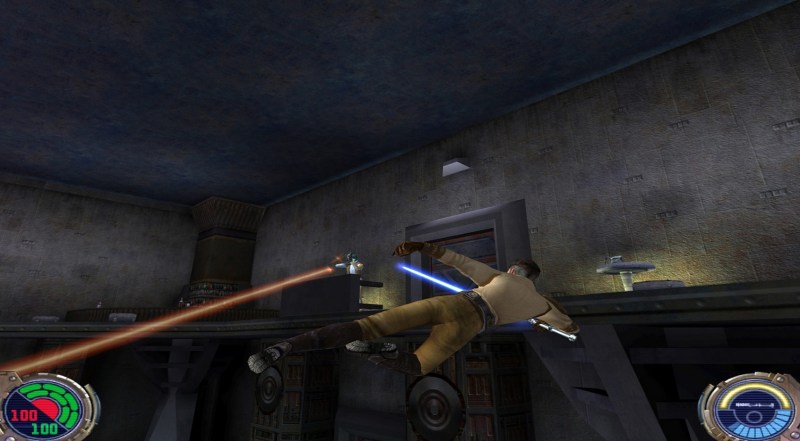
Above: Star Wars Jedi Knight II: Jedi Outcast for the Switch and PS4.
GamesBeat: Is that something you guys are thinking about? Or is that something the Microsofts of the world are more able to do?
Howard: No, we’re totally thinking about it. We’re still a small company that’s growing a lot. We tend to go pretty far down the rabbit hole on what would be the coolest thing to do for players. We have a lot of big ambitions for a number of our upcoming titles in terms of merch and special editions and collectibles, just super creative ways to extend the experience of these games. That’s one of the big things we’ll be tackling over the next 12 months. What is our physical strategy? And by that I don’t just mean a game in a box, but the whole merch thing.
On the development and publishing side, when you’re a part of creating those things and seeing the fan response, it’s one of those “Pinch me, is this my job?” moments. Making people so happy is a lot of fun.
GamesBeat: There’s the inventory risk. That’s what drove down the original THQ. They had too many of those learning tablet things.
Howard: Yeah, uDraw. That was the nail in the coffin. Overinvesting in physical goods inventory is a rough place to be. But now there are these awesome people in the middle that can lower margins and allow you to sell direct to consumer and do really limited runs. You can pre-sell, so that you’re not taking on as much risk. Hopefully that can get us out of that kind of a situation.
Here in Austin there was an announcement around Rooster Teeth laying off a number of people. Then the internet debate becomes — I don’t remember the term they used. The nerd market? The geek market? That market softening. But I don’t know if it’s that market softening so much as it’s just so cyclical. We’re in this new world where the cycles take way less time than we’re all prepared for. Things are just moving really fast. Tastes are changing. Expectations are changing.
The thing that’s not changing is that great games still continue to succeed. That’s our focus. How do we make sure we’re shipping quality experiences? How do we continuously improve in making sure we have the right people around here, we’re creating a great culture, we’re shipping great things? We want to delight the fans, basically.
GamesBeat: In August the NPD folks pointed out that this was the worst August in many years. I wondered if the dip is real in terms of the last year of the console cycle. Does that give you some pause about what’s going to happen in the different sub-markets here?
Howard: You know, I don’t think so. I think it’s representative of the big releases. If you look at that NPD list, the top-selling games, a lot of those games were not new. You have your juggernauts that are still on the top of the list. There were only a few titles that were new releases. I think we’re still dependent on giant games releasing to stretch the market.
To your point, maybe we’ll see a lull in that as we transition to the new consoles. But I think that customers still want new games. I live in a household of boys and work in an office full of gamers. Everybody just wants something new to play. I think the hunger is still there. We’re just not satisfying the market demand right now with great new things that people want to play. We’ll see what happens this fourth quarter, with a lot of big releases coming.
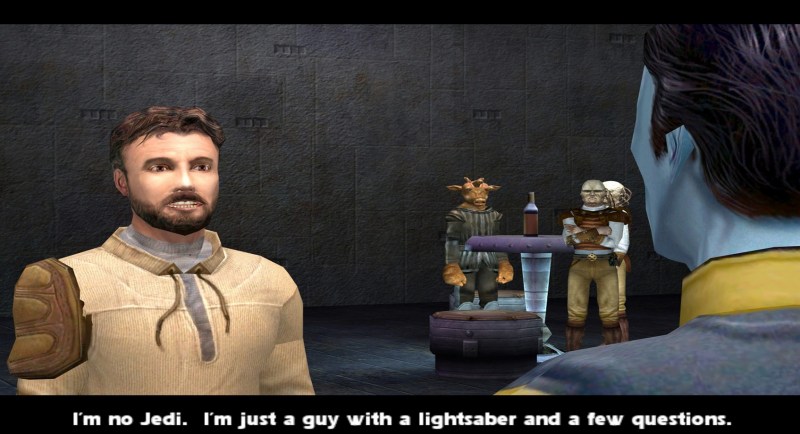
Above: Star Wars Jedi Knight II: Jedi Outcast for the Switch and PS4.
GamesBeat: I wonder if that makes the PC and the Switch more attractive right now than PS4 or Xbox One.
Howard: Well, you can look at the risks and benefits. The benefits of shipping content late in a console cycle, you have this peak installed base. The risks, how much are first party going to be investing and marketing to that audience? Will they be able to support you? I mentioned Stubbs the Zombie earlier, a game that Aspyr published in 2005. We launched this game as an Xbox and PC exclusive. I think it was 35 days before the Xbox 360 came out. [laughs] That was not the best strategy.
But my understanding is that future platforms are going to be backwards compatible. I don’t want to be naive about that, but I feel like there’s a reduced risk this time. We’re certainly going to be shipping stuff for the next 12 months on whatever platforms we can get our hands on, for the most part, while we’re building some of these longer-term big experiences. Again, we’re in the middle, so there’s probably an opportunity for us.
GamesBeat: Was there anything else you wanted to add today?
Howard: When there’s an announcement as big and significant for us like the Star Wars announcement, my big purpose is to give fans comfort. “Hey, these guys know what they’re doing.” Because we were in the Mac space for so long, people might not be aware that we’ve been around for 20 years doing this kind of work, and we’ve done it really well. That’s my big goal. Don’t worry. We’ve got this. We’re going to continue to do our best to bring great games to you guys.
